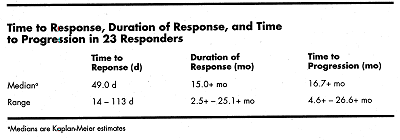Rituximab: Phase II Retreatment Study in Patients With Low-Grade or Follicular Non-Hodgkin’s Lymphoma
A 60-patient phase II study was conducted to determine the safety and efficacy of retreatment with the anti-CD20 monoclonal antibody (MoAb) rituximab (Rituxan) in patients with low-grade or follicular non-Hodgkin’s lymphoma (NHL). Patients were relapsed or refractory to prior chemotherapy but had previously responded to rituximab. Upon progression of disease, patients received IV infusions of rituximab at 375 mg/m² weekly × 4. Patient characteristics were 55% males with medians of: age, 56 years; three prior therapies; 14.2 months since last treatment; and 4.7 years since diagnosis.
A 60-patient phase II study was conducted to determine the safety and efficacy of retreatment with the anti-CD20 monoclonal antibody (MoAb) rituximab (Rituxan) in patients with low-grade or follicular non-Hodgkins lymphoma (NHL). Patients were relapsed or refractory to prior chemotherapy but had previously responded to rituximab. Upon progression of disease, patients received IV infusions of rituximab at 375 mg/m² weekly × 4. Patient characteristics were 55% males with medians of: age, 56 years; three prior therapies; 14.2 months since last treatment; and 4.7 years since diagnosis.
The safety profile was similar to that reported for initial treatment with rituximab, consisting primarily of infusion-related events usually occurring within the first few hours of the first infusion. The most common infusion-related events included fever, asthenia, chills, pruritus, and throat irritation. Less frequent events included leukopenia, nausea, transient bronchospasm, and mild hypotension. No human antichimeric antibody (HACA) reactions were reported.
Of the 60 patients, 57 were evaluable for efficacy. The overall response rate (ORR) was 40%, with 6 (12.5%) complete responses (CRs) and 17 (28.6%) partial responses (PRs). Medians for time to progression (responders) and duration of response have not been reached after 16.7+ months and 15.0+ months of observation, respectively.

CONCLUSION: Patients with relapsed or refractory low-grade or follicular NHL are considered incurable, with a median survival of about 4 years from the first relapse. Their history is characterized by repeated courses of chemotherapy followed by relapses (with progressively lower ORRs and shorter durations), development of chemoresistance, and impaired marrow reserves. This study shows that such patients can be safely and effectively treated with multiple courses of rituximab without significant myelosuppression or induction of HACA. Experience to date suggests that rituximab does not induce resistance to subsequent chemotherapy or reduce its efficacy. The benefits of multiple courses of rituximab include deferring toxic alternative treatments and preserving marrow function.
Click here for Dr. Bruce Chesons commentary on this abstract.